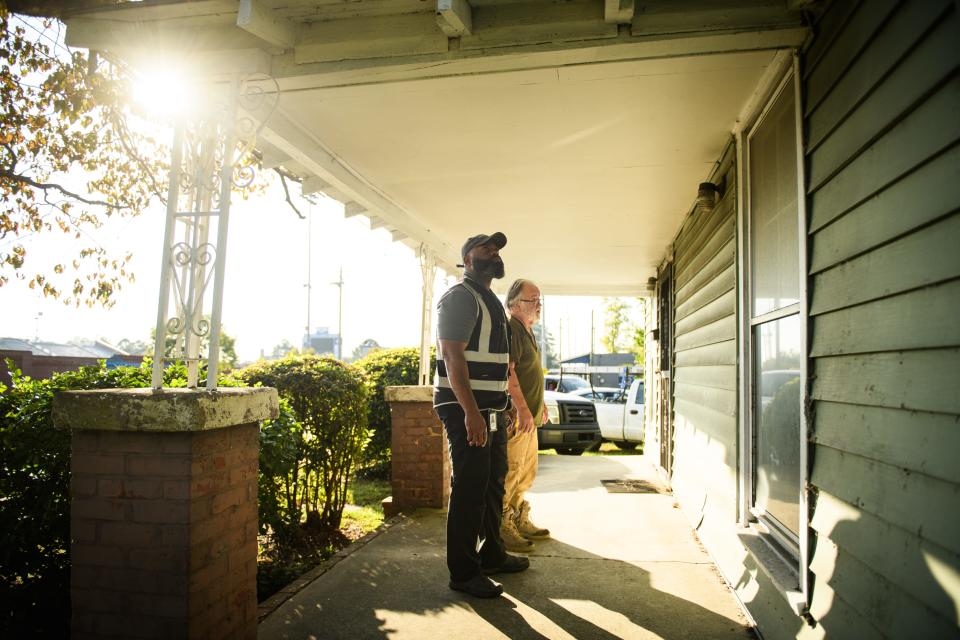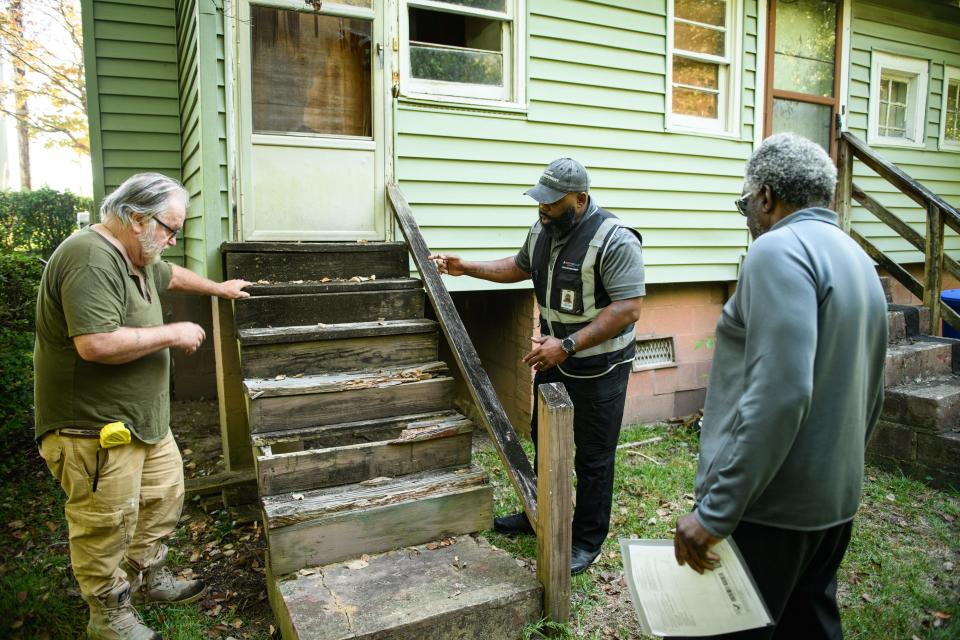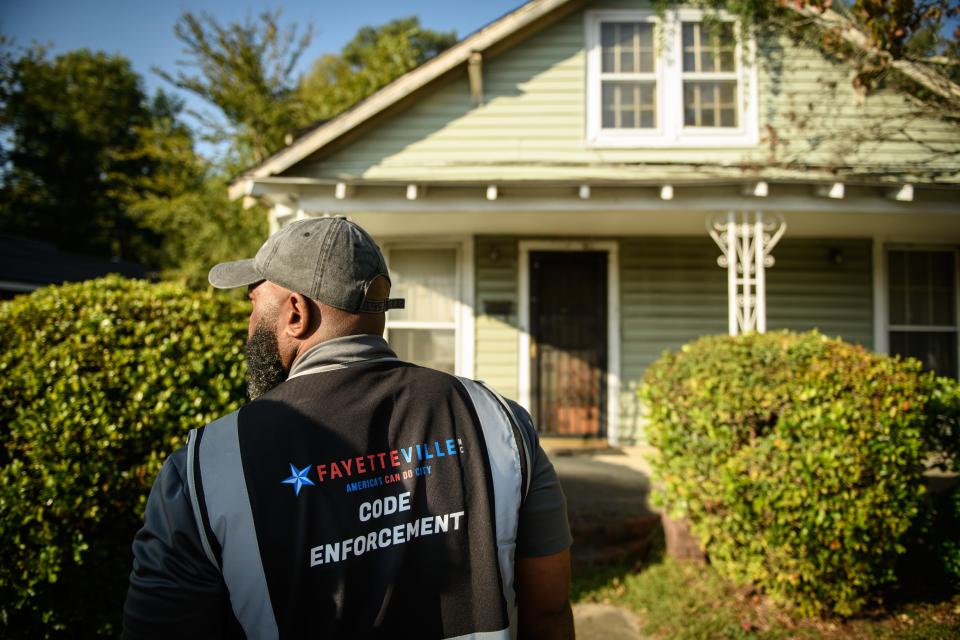Why do Fayetteville's code enforcement employees handle so many cases?
Fayetteville’s code enforcement employees each handle about 1,106 cases per year — more than double the average caseload of their peers in larger cities like Charlotte and Raleigh, city officials told the Fayetteville City Council at its work session on Monday.
Calling the city’s code enforcement officers “the guardians of the city,” Jerry Newton, the director of development services, said that not only was the caseload double, but the number of officers was half compared to those other cities. The council heard a presentation from Newton and James Rutherford, the division manager for housing and code enforcement, after requesting information in August on strategies to reduce the amount of time property owners have to address code violations.
According to Rutherford's presentation, Raleigh's 29 full-time code enforcement employees handle 123 cases each on average, while Charlotte's 61 full-time code enforcement employees average 903 cases per employee. The total average caseload for Fayetteville's peer cities — Charlotte, Durham, Greensboro and Raleigh — is 497 cases per full-time employee, Rutherford said.

Rutherford said Tuesday that the number of cases handled by each of the city’s nine code enforcement officers would actually be even higher. Monday’s presentation averaged the number of cases per the department’s 13 full-time employees for the purpose of comparing Fayetteville to other cities in the state, he said.
Rutherford’s presentation noted that the majority of code enforcement cases stem from violations noted by code enforcement officers. Out of 14,499 cases over the past year, 9,695 were officer-initiated, while 2,970 arose from resident complaints and 153 were tied to complaints from council members, Rutherford said.
Code violations include issues such as overgrown grass, abandoned vehicles, dangerous buildings, graffiti and basketball goals in the street, according to a code enforcement brochure.
Council members questioned Rutherford and Newton on the efficacy of the code enforcement process, expressing frustration with the current number of violations seen across the city.
“Your team’s working hard, but it’s not necessarily yielding a better-looking product,” Mayor Mitch Colvin said.
Colvin and Councilwoman Kathy Jensen suggested the council set up a committee to investigate how the city can resolve code violations quicker than the current average time of 36 days.
“We’re waiting too long,” Jensen said. “This is very serious. We need to talk about it."

What do they do?
According to the brochure, the code enforcement office is comprised of a manager, two supervisors, an administrative staff member and nine inspectors. Those nine inspectors work from 7 a.m. to 6 p.m. on weekdays, with each inspector assigned to a territory of more than 20,000 residents, the brochure states.
According to city data, the most common type of violations are waste violations, which comprise 47.5% of cases. Zoning violations represent 12.87% of cases, while vehicle violations are 12.65% of cases, the data shows. The remaining seven of the top 10 violations in the city are substandard buildings; sign violations; fencing violations; streets and sidewalk violations; building violations; graffiti; and trailer violations, according to the data.
Most code violations result in a civil penalty if left unaddressed, the brochure states, though some repeat offenders could face criminal charges. According to the 2023-2024 fee schedule for the city, the default penalty for a code violation is $100 per day if the issue hasn't been addressed within 10 days of the warning. Owners of properties designated as nuisances can be fined $1,000 for each violation, the schedule states.

'Very proactive'
Rutherford said Tuesday that the high number of cases stems from his team’s initiative in identifying code violations.
“Our Code Enforcement team is very proactive,” he said. “One of (the City Council’s) initiatives is that code enforcement should be proactive and remain proactive as opposed to some municipalities.”
Rutherford noted that other cities may have a reactive approach to code enforcement, whereas Fayetteville both responds to complaints and seeks out code violations.
That doesn’t necessarily indicate a problem, Rutherford said.
“It’s always a challenge for us to keep up that pace and keep up the level of activity that we keep up, but that’s just what we do in order to keep the city looking at the level it is now, providing the level of service we do now,” he said. “You would definitely see the results out there on the streets, in the neighborhoods, if we only did half of what we’re doing now.”
Rutherford acknowledged that parts of the city code may be complicated for residents to understand, but code violations are an opportunity for the department’s employees to educate the public on the law, he said.
“That’s a big part of our job, to serve as educators,” he said. “We can offer solutions to them to come into compliance and ways they can accomplish what they’re trying to do if it’s possible.”
The council reached a consensus Monday to consider forming the committee suggested by Colvin and Jensen.
Government watchdog reporter Lexi Solomon can be reached at ABSolomon@gannett.com.
This article originally appeared on The Fayetteville Observer: Fayetteville code enforcement employees face large caseloads

